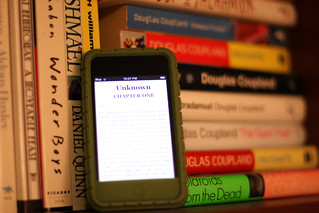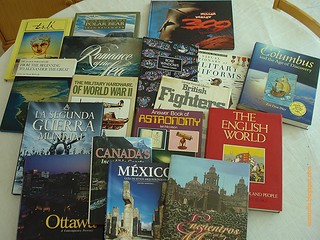Below is an expanded account of our discussion, along with some links that provide more food for though.
A Dead Tree crowd
Out of 9 persons in attendance, only 3 owned e-readers --two Kobos and one iPad.One of the Kobos is virtually unused, the owner citing difficulty of finding and loading books as the main reason. The other one is used as a repository for PDFs the owner assembles out of articles that interest him.
The iPad is used heavily for e-book and other content consumption, such as web browsing, watching videos and listening to podcasts.
 |
| Photo © Devon Christopher Adams, Flickr |
e-Readers are cool but they don't have that smell
Consider: George R.R. Martin's immensely popular Song of Ice and Fire books (aka Game of Thrones) each run between 700 and 1,000 pages on paperback, and there will eventually be 7 books in the series.Paper books are bulky and heavy. Having read some of the series in electronic and others in paper, I prefer the former, especially with such a vast number of characters, where it is easy to lose track of who is who and doing what to whom. The ability to look up a character by clicking on his/her name and searching online definitely enriched my experience. Having said that, I look forward to purchasing and rereading the whole dead tree set once Mr. Martin completes it, space, budget and spouse permitting.
Harry Potter on my iPad is great when travelling, but each physical book in my collection was obtained under different circumstances, which makes it so special to me, especially considering that moving to Canada meant letting go of almost all my physical library. My sister owns a Kindle, which she uses on long trips, and has bought paper versions of books purchased earlier in electronic form.
In conclusion, the e-reader may be more practical and efficient, but the tactile and olfactory experience of opening up a new or old book brings about a sensation of ownership that is not there for bits and bytes.
Do you really own your e-books?
There was a lengthy discussion on piracy and Digital Rights Management (DRM). Some vendors (i.e., Amazon) licence the e-book to you, which means you can't copy the book from a Kindle to a Kobo, and they can erase your purchase from your device if they decide you violated the licensing terms.In contrast to Amazon's licensing scheme, Tor Books, a leading publisher of science fiction books, announced in April 2012 it would retail its books in DRM-free format. Customers applauded this move, since they can copy their books between devices without restriction. Apparently this move has not hurt their business.
Somehow, passing an e-book from one generation to the next does not have much of an allure.
The situation is in flux - just look at the music and cinema industries; the lawsuits have only recently begun in the publishing business. For two excellent summaries, take a look here and here.
A couple of weeks ago, my wife recently ordered a paper book from Dogwise Publishing a small independent Norwegian publisher, and was pleasantly surprised when she discovered the price included a DRM free download of the book. I hope more publishers follow their lead.
Do e-Readers really save all those trees?
Conventional wisdom says that e-readers benefit the environment, because of all the trees that are saved by having the books set in bits and bytes as opposed to paper.One attendee asked what happens when we upgrade our device to the latest and greatest new gadget? If the device is not properly disposed of or recycled, and ends up in a landfill, does the ecological footprint outweigh all the trees it "saved"?
This is a concern, given our consumer society's appetite for the latest and snazziest devices. The verdict is still out on this one.
In several countries, paper currency is increasingly made out of polymer materials. I wonder what research, if any, is being done on sustainable eco-friendly paper-like materials. After all, the written word has gone on a journey through cave walls, wet clay, wax, sheepskin, parchment, paper and now silicone chips; who knows what the next stage is going to be like?
Can an e-Book be as beautiful as the paper version?
E-readers cannot compete with coffee table books as decoration items or conversation pieces -yes, books are also frequently an ornamental (vanity?) statement.Apps like Flipboard and photograph slideshows bring some of that experience to the more powerful gadgets, but it is not as powerful as a coffee table book.
e-Books: Nice and practical, but paper is here to stay (for the time being)
As a whole, the group leaned towards the traditional paper books, but recognized the convenience of e-readers.The media for writing and reading has been evolving ever since man first etched signs on wet clay or wax tablets, all the way through the Gutenberg press and modern electronic printing systems. From a historical perspective, it is very recent that books are massively available.
Electronic reading devices -in e-reader or tablet form- are not for everybody, for reasons of tradition or functionality.
The e-book publishing model lags behind the music and film publishing industries, which are still developing.
Fortunately the ability to carry thousands of books to read on the go, does not preclude cuddling up by the fireside with a paper edition of your favourite book, with a handwritten dedication from somebody special.
I want to give special thanks to Randall McKinnon for inviting me to participate in this exercise, and to Simon Fraser University for supporting the Philosopher's Cafés.
To learn more about SFU's Philosopher’s Cafés, visit their page at SFU page, and on Facebook.

1 comment:
Y preffer 100% paper books, is like the dilema of using vinyls for music or using a mp3, Vinyls have their touch to music you can't go for quality, same as ebooks they are practical and easy to carry, bookmarks and stuff...but I can't read with a kindle and a couple of chocolate in a rainy day, that simple doesn't match...like a wifi in a stadium alone it need to be completed by a Wlanrepeater to fulfil his porpoise.
Post a Comment